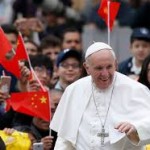(Monday Vatican. ANDREA GAGLIARDUCCI).
That papal diplomacy under Pope Francis has two speeds became evident once more when news broke of the arrival of the bishop of Shanghai, Joseph Shen Bin, in Rome. The bishop is in town to participate in an event to mark the hundredth anniversary of the Plenary Council of Chinese Catholics in Shanghai in 1924. However, Shen Bin is not just any bishop. His effectively unilateral appointment to Shanghai by the Chinese government was a symbolic slap in the face for the Holy See, and an eloquent expression of Beijing’s take on the controversial Sino-Vatican agreement that is supposed to create a power-sharing framework for the appointment of bishops. At the height of a series of tensions, also because Pope Francis had given a wide opening of credit to the Mongolian Buddhists linked to the Dalai Lama and Tibet, the Chinese authorities decided they could make a move: Appoint a bishop already ordained with the double approval of Rome and Beijing, to a high-profile diocese like Shanghai, where one bishop – Thaddeus Ma Daqin, had already been appointed. Ma Daquin, however, had remained under house arrest from that moment, punished by the authorities Chinese for leaving the ranks of the Patriotic Association. After a few months of reflection, Pope Francis decided to “remedy” the nomination of Shen Bin as bishop of Shanghai and proceeded with the nomination. There is no news on a change of assignment for Ma Daqin, who remains under house arrest. Practically, Cardinal Pietro Parolin, Vatican Secretary of State, had wanted to explain the Pope’s choice with an interview, highlighting how the Beijing government had gone beyond the spirit of the agreement.

